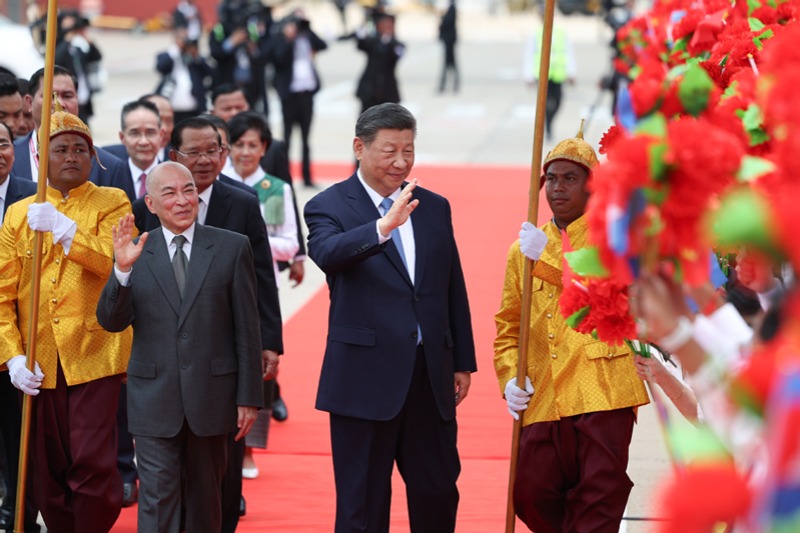Anti-poverty efforts also benefits front-line worker

BEIJING-China's poverty alleviation work does more than just create wealth for impoverished residents. It also brings warmth to front-line participants.
Shi Peng, a patent examiner at the National Intellectual Property Administration, is one of hundreds of thousands of officials stationed in rural China to spearhead poverty reduction efforts. Since 2017, the 38-year-old has been dispatched to two villages in Sangzhi county, Hunan province.
Spending four years in a mountainous county, once home to some of the poorest areas in China, would perhaps be seen as a hardship for many, but Shi cherishes it. "I have learned a lot from the people I helped and served," Shi said. "That can never be achieved through office work."
Engaging in patent work for more than 10 years, Shi grew tired of his regular job sitting in front of a computer all day. He thought poverty alleviation was an opportunity to change.
"I was not afraid of living in poor conditions. I was born and grew up in rural areas, too," Shi added.
However, he was terrified by an unexpected guest not long after arriving at Cangguanyu village.
One day, he spotted a tail poking out from under the door of his dormitory. He choked back his nervousness and called villagers nearby to help. It was not until midnight that they caught the intruder-a venomous snake. Later, some volunteered to bring him snake repellent, which they sprayed all over the room. "I was very scared, but their concern for me warmed my heart," Shi said.
In the first few months, he tried hard to adjust to life in the countryside: spicy food, strong accents and widespread smoking. The gentle, bespectacled patent examiner became dark-skinned and indifferent about his appearance. Black earth stuck beneath his fingernails.
While learning to do farm work, Shi led the fight against poverty through the construction of roads, schools and power supplies. He also taught village officials how to use computers.
One of Shi's proudest achievements is enabling farmers to harvest the benefits of geographic identifications, a significant part of intellectual property.
A GI is a type of trademark that shows the specific geographical origin of a product, attesting to its quality and distinguishing it from its competitors.
Shi and his colleagues found the abundant water and mild temperatures made the county suitable for growing white tea, which tastes faintly sweet and has anti-inflammatory properties.
However, the tea had previously failed to capture the public's imagination. Poor sales disappointed many local enterprises, and farmers left to find work in big cities.
In 2017, Shi's administration helped local tea companies obtain a GI. Since then, the local white tea industry has developed rapidly, with increased production and more employment opportunities for locals.
Farmers involved in tea production and marketing have shrugged off poverty and now make a good living.
The success of the GI-based approach is also clear in the local industries selling sweet pomelo and zongzi leaves-raw materials for Chinese glutinous rice dumplings, or zongzi, as well as sushi.
At the end of 2019, two villages Shi helped were removed from the poverty list.
Happy to see more smiling faces, Shi found that villagers who escaped poverty and became better off began learning to give rather than receive.
Shi was particularly impressed by a 75-year-old Cangguanyu villager who, having planted 3,000 trees many years ago as an investment for his mentally disabled son, donated the mature forest to the State.
In 2018, after months of investigation, Shi and his village officials helped the son apply for government aid to ensure his basic needs were met, alleviating his father's worries.
Some tree dealers once offered an attractive price to buy the 3,000 trees, each of which can sell for 100 yuan ($15.50), but the father refused. Instead, he decided to donate the trees to his homeland.
"The forest has grown as high as a two-story building. Since the day they were planted, those trees were my greatest hope. But now, I no longer need to rely on them," Wu Shili, the father, said. "I appreciate the government assistance, but I have nothing to repay my debt with. I decided to donate the forest to the nation after my death, as a small token of my gratitude."
Shi was touched.
"I used to look on poor people with compassion. But they are much stronger than I thought and worthy of our respect," Shi said.
Apart from battling poverty, Shi has treated the villages as his second home. He brought his family to have dinner with locals, invited senior village cadres to visit the hometown of Mao Zedong and asked his elder son to watch a national-flag-raising ceremony with village children.
Though his stay in Hunan ended recently, Shi hopes more local students can realize their college dreams as poverty in this mountainous county becomes a thing of the past.
Xinhua
- C919 jetliner marks 'China Film Consumption Year' with themed flight
- China embraces next-gen solid-state battery revolution with tech breakthroughs
- Renovation project on Beijing's east sixth ring road opened to traffic
- Chinese researchers make breakthrough with immune cells
- Number of rare diving duck soars
- Robots comfort seniors at care center





































